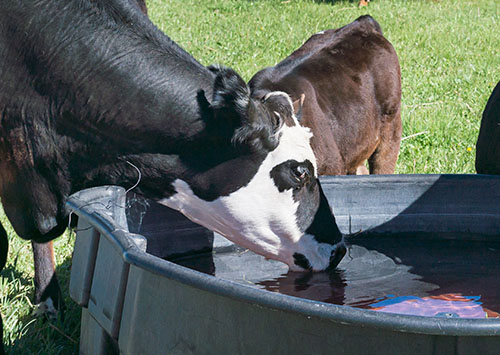Controlling Algae in Water Tanks
Jul 26, 2021

Got Algae? You’re not alone. Algae buildup in stock tanks is a constant challenge that many livestock owners face during the summer months. Not only is this green slime unsightly, but some algae are even toxic to animals, especially when allowed to accumulate over time.
What can livestock owners do to prevent buildup? Luckily, there are a few guidelines that can be followed to mitigate this occurrence:
The best way to control algae is to clean the tanks consistently. With just a few minutes devoted each week to stock tank maintenance, the time and labor it takes to complete this task will be drastically reduced.
Give some forethought into the most efficient way to get the job done before starting the cleaning process. Some tanks, when full, are too heavy to tip over and empty out. If no drain is present, simply turning the water off for a day or two and letting your livestock drink it dry is often easier than trying to turn the tank over.
Scrub the sides and bottom of the tank and rinse thoroughly with water to remove all algae growth and prevent buildup. Using a stiff brush with a long handle will make the task easier on your back and save time.
Livestock owners can also utilize commercial chemical treatments to kill algae in stock tanks. Copper sulfate is one such product that is commonly used; however, this chemical is highly corrosive and can shorten the life of metal tanks. Reapply this product every two to four weeks and keep up the applications until the algae growth has stopped.
Household bleach can also be used as an algaecide, and the chlorine in bleach will help to sanitize the water as well. Add two to three ounces of bleach per 50 gallons of water and reapply every week to prevent algae growth in your tank.
Once your tank is clean, thoroughly rinse it to remove any extra bleach and chemicals. Letting your tank air out in a sunny space for a couple of hours will neutralize any bleach residue by breaking it down and will kill any remaining organisms.
Now your tank is clean and ready to be filled up again! For additional tips, click here.
By following these maintenance guidelines, you can be sure that your livestock have access to fresh, clean water all summer. For cleaning tools, algae treatments, or a new water tank, visit your local Co-op.
For more content like this, check out the latest issue of the Cooperator.
What can livestock owners do to prevent buildup? Luckily, there are a few guidelines that can be followed to mitigate this occurrence:
The best way to control algae is to clean the tanks consistently. With just a few minutes devoted each week to stock tank maintenance, the time and labor it takes to complete this task will be drastically reduced.
Give some forethought into the most efficient way to get the job done before starting the cleaning process. Some tanks, when full, are too heavy to tip over and empty out. If no drain is present, simply turning the water off for a day or two and letting your livestock drink it dry is often easier than trying to turn the tank over.
Scrub the sides and bottom of the tank and rinse thoroughly with water to remove all algae growth and prevent buildup. Using a stiff brush with a long handle will make the task easier on your back and save time.
Livestock owners can also utilize commercial chemical treatments to kill algae in stock tanks. Copper sulfate is one such product that is commonly used; however, this chemical is highly corrosive and can shorten the life of metal tanks. Reapply this product every two to four weeks and keep up the applications until the algae growth has stopped.
Household bleach can also be used as an algaecide, and the chlorine in bleach will help to sanitize the water as well. Add two to three ounces of bleach per 50 gallons of water and reapply every week to prevent algae growth in your tank.
Once your tank is clean, thoroughly rinse it to remove any extra bleach and chemicals. Letting your tank air out in a sunny space for a couple of hours will neutralize any bleach residue by breaking it down and will kill any remaining organisms.
Now your tank is clean and ready to be filled up again! For additional tips, click here.
By following these maintenance guidelines, you can be sure that your livestock have access to fresh, clean water all summer. For cleaning tools, algae treatments, or a new water tank, visit your local Co-op.
For more content like this, check out the latest issue of the Cooperator.